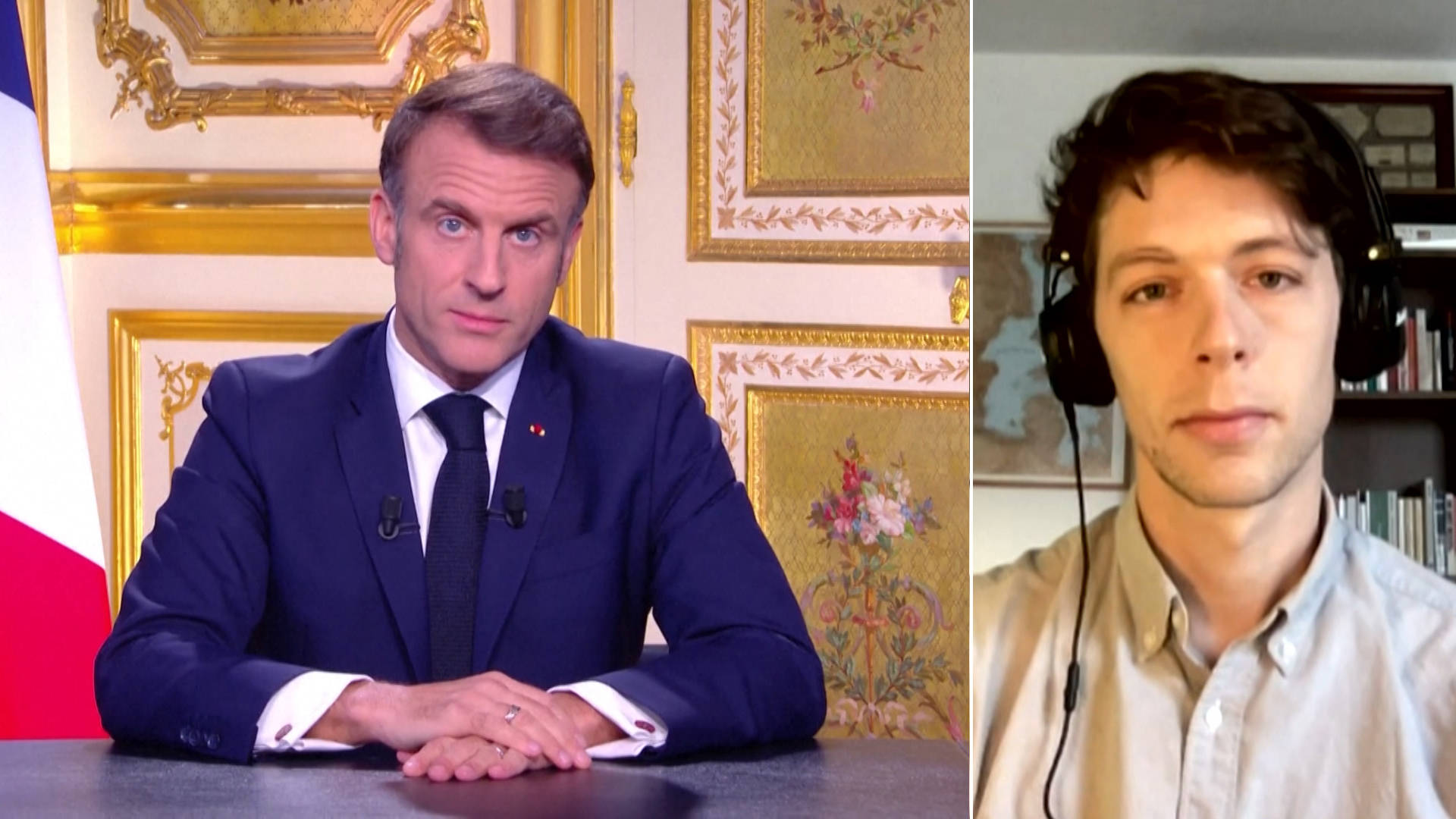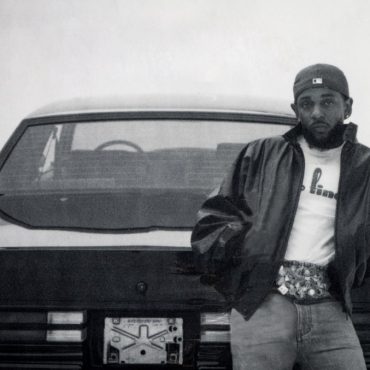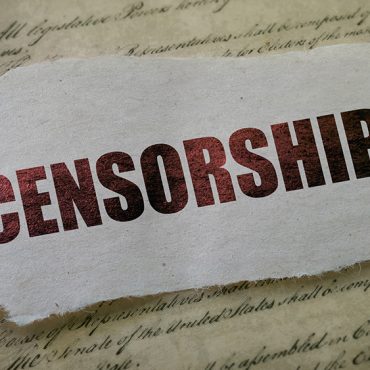This is a rush transcript. Copy may not be in its final form.
AMY GOODMAN: This is Democracy Now!, democracynow.org, The War and Peace Report. I’m Amy Goodman, as we turn now to France, where it is in political turmoil after leftist and far-right lawmakers united to oust Prime Minister Michel Barnier in a no-confidence vote Wednesday. The vote came amidst intense opposition to Barnier’s budget proposal and its roughly $60 billion in spending cuts and tax increases — the first time France’s government has fallen to a no-confidence vote since 1962. On Thursday, the French President Emmanuel Macron rejected calls to resign, said he’ll soon name a new prime minister.
PRESIDENT EMMANUEL MACRON: [translated] We cannot allow ourselves to be divided or to do nothing. That’s why I will name a prime minister in the coming days. I will ask them to form a government in the general interest, representing all the political parties who can participate in it, or at least to agree not to bring it down.
AMY GOODMAN: We’re joined now from Marseille, France, by Cole Stangler, journalist covering politics and labor issues in France. His most recent book, Paris Is Not Dead: Surviving Hypergentrification in the City of Light.
Thank you so much, Cole, for being with us. Talk about what’s taken place. This is historic.
COLE STANGLER: Yeah. Thank you. Thank you so much for having me.
Like you said, it’s the first time that we’ve had a government fall to a motion of no confidence since 1962. This is the shortest-lived government really in the history of the Fifth Republic. And we’re in this unprecedented situation of turmoil. And I think, you know, we can look for deeper reasons to try to understand the political crisis that France is in, but if you want to look at it a little bit more simply, you know, this comes down to really two big factors here.
One is we have to go back to Macron’s — President Macron’s decision to dissolve the National Assembly this summer, a move that might go down as probably one of the greatest own goals, let’s say, in French political history. So, Macron, when he dissolved the National Assembly, what that meant is we went to new elections. And in those new elections, the National Front — the National Rally, excuse me, the far-right National Rally, increased its share, Macron’s party decreased its share. And so, it left a situation in which we had three — basically, three main blocs in the National Assembly, none of which was able to form a majority of their own. So, Macron lost — self-inflicted wound — lost his relative majority in the National Assembly by calling for those elections.
And then, secondly, again, to get back to Macron’s responsibility here — secondly, the crisis has its roots in the way that Macron responded to those elections. So, like I said, after those elections, we had three blocs in the National Assembly — the left, the left bloc, the New Popular Front, with a slight lead on the rest, but basically three evenly split blocs. And instead of turning to the parties that — instead of turning to what the voters expressed at the polls, which was support for the center and for the left, Macron decided to name a prime minister on the right, so a prime minister that did not actually reflect what voters expressed at the polls.
So, it’s really those two big issues, to simplify. It’s, one, Macron’s decision to call those elections in the first place, which backfired, decreased his party’s share in the National Assembly, and, secondly, the fact that his government here, that’s falling, did not reflect what voters actually expressed at the polls earlier this summer.
AMY GOODMAN: So, Barnier is a former EU official. He’s been forced to step down as prime minister. The president says he’s going to name a new prime minister. Can you talk about who exactly he’s talking to? You have everyone from Marine Le Pen, on the far right, to Mathilde Panot, leader of the left-wing France Unbowed party. And Marine Le Pen, who now faces a verdict in a criminal embezzlement case in the next months, which could potentially make her ineligible to run for office for years, is that right?
COLE STANGLER: Yeah, that’s right. And that also might be part of the reason why there’s calls to move to a presidential election from — in certain parts of the far right. But, you know, the key issue here is we still have the same mathematical problem that we had after the elections this summer, which is: How do you find a prime minister that’s able to get enough support in the National Assembly, or that’s able to at least withstand a motion of no confidence? So, you have to get someone who cannot have 289 members of the National Assembly vote against them. That’s really the goal here.
And the question is: Is Macron going to basically try to do the same thing that he did this summer, which is to say, “I’m going to turn to the right,” and de facto let the National Rally be the one that’s going to decide whether or not to let the — to have the government stand or not? Or is he going to turn to the left? That’s what the members of the national — the New Popular Front, the left-wing coalition, have been calling for. But to be quite frank, Amy, if you look at the way that Macron spoke last night, it doesn’t seem like we’re going to have a change of tack, doesn’t seem like we’re moving to — that Macron wants to name a left-wing prime minister.
But again, the main situation here is that, at a certain point, it’s not really Macron’s decision to make. We have a mathematical problem. France needs to have a government, and you have three pretty evenly split blocs. So, at some point, that mathematical reality requires choices to be made.
AMY GOODMAN: And finally, Cole Stangler, you have President-elect Trump going to France, in his first international trip since he was reelected president, for the reopening after the fire of Notre-Dame Cathedral?
COLE STANGLER: Yeah, I mean, the timing there is quite remarkable, because we have a president now, you know, President Macron — I mean, you can maybe say that both these presidents are in very different — or future president in the case of Trump — in different situations. Macron is increasingly isolated, extremely unpopular, if you look at his popularity in the —
AMY GOODMAN: We have 10 seconds.
COLE STANGLER: Yeah, extremely unpopular president, increasingly isolated, so Macron not in a very favorable position right now.
AMY GOODMAN: Cole Stangler is a journalist speaking from the French city of Marseille. And we’ll link to your articles.
Democracy Now! is produced with Mike Burke, Anjali Kamat, Renée Feltz, Deena Guzder, Messiah Rhodes, Nermeen Shaikh, María Taracena, Tami Woronoff, Charina Nadura, Sam Alcoff, Tey-Marie Astudillo, John Hamilton, Robby Karran, Hany Massoud, Hana Elias. Our executive director, Julie Crosby. I’m Amy Goodman. Thanks so much for joining us.











Post comments (0)